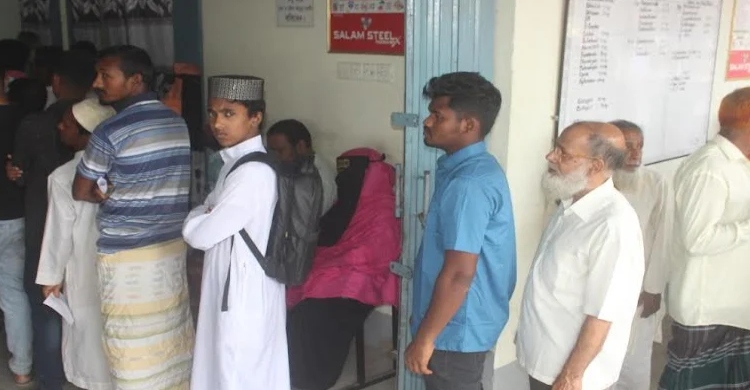Improved healthcare draws patient surge to Khulna hospitals


Hospitals in Khulna are witnessing a significant increase in patient numbers, driven by recent improvements in healthcare services, infrastructure and medical professionalism.
Following a series of initiatives by the Department of Health, both public and private hospitals have seen a dramatic increase in patient numbers.
Yet, alongside this surge, the quality of healthcare services has also notably improved, ushering in a new era of hope for patients from the south-western region of Bangladesh.
The transformation is visible across hospitals, where a qualitative shift is unfolding. Specialist doctors are spending more time with patients and private hospitals are in a competitive race to enhance service standards.
A mix of improved medical professionalism, greater transparency and infrastructural development is driving this change, positioning Khulna as a growing healthcare hub for the region.
The 500-bed Khulna Medical College Hospital (KMCH), the largest medical facility in the region, is now treating over 2,500 inpatients daily-far exceeding its capacity. Just a few years ago, the hospital averaged 1,200 to 1,500 patients per day.
During a recent visit, this reporter observed patients being treated in corridors and stairwells due to space limitations.
Despite the overcrowding, doctors continue to deliver uninterrupted services from morning to afternoon, with specialist physicians regularly stationed in the emergency department to meet the rising demand.
Hospital cleanliness and administration have also seen marked improvements. Wards and restrooms are cleaner and a public toilet is under construction nearby. Plans are underway to establish in-house pharmacies in public hospitals to provide essential medicines at affordable prices.
Additionally, KMCH is preparing to launch a dedicated Cancer Institute and a modern Intensive Care Unit (ICU).
Talking to BSS, Dr. Mizanur Rahman, assistant director of KMCH, said, "This hospital is gradually becoming a model healthcare facility on the southern side of the Padma River. Patients are arriving from across the
division and our specialists are fully engaged, with no absenteeism during duty hours."
He noted that improved patient care is one of the key reasons the hospital is operating at three to four times its bed capacity.
"We are doing everything possible to ensure that each patient receives attention, despite the overwhelming numbers," Dr. Mizan added.
Besides, the Khulna Sadar Hospital, a 250-bed government healthcare facility, is also witnessing overwhelming numbers-over 3,000 patients seek treatment daily, and more than 600 are currently admitted.
Meanwhile, the city's 250-bed Khulna specialized hospital is consistently treating around 1,000 patients in a day.
According to patients, there have been noticeable improvements in cleanliness, availability of medicines, and the attitude of healthcare staff compared to the past.
Talking to BSS, Moinul Islam Gain, admitted at KMCH from Rampal Upazila in Bagerhat, said, "I've been here for seven days. A senior doctor attended to me once and intern doctors have provided care since. I've recovered significantly."
Zahirul Islam, from Jashore, brought his daughter for treatment. "She was admitted 12 days ago. Thanks to the dedication of the medical team, she's now recovering well," he said.
Md Milon Gazi, admitted to Khulna Sadar Hospital with abdominal pain, said, "Service quality has noticeably improved. I feel better under the doctors' care."
Additionally, private hospitals in the city are also undergoing dramatic changes due to the influx of patients.
At Khulna City Medical College Hospital (KCMCH), the city's most expensive private hospital, it has become difficult to secure a cabin due to the overwhelming influx. Many specialists from KMCH also run private chambers here, keeping over 400 cabins fully occupied.
Simi Chowdhury, a resident of Nirala residential area, said, "I was admitted here with gallstone pain and underwent surgery. I've recovered fully and am satisfied with the service."
Healthcare professionals believe that this overall shift in the medical landscape is largely driven by the renewed sincerity of doctors and the restoration of people's trust in the country's healthcare system.
Dr. Mosammat Mahfuza Khatun, Civil Surgeon of Khulna told BSS, "Doctors, nurses, and all healthcare staff are now more committed than ever to patient care.
"Patients are placing greater trust in our healthcare system than before. Even if there are minor delays, people no longer feel compelled to travel abroad for treatment," she said.
Dr. Md. Monjurul Murshed, director of Health for Khulna Division, echoed the same sentiments. "The division's healthcare system has seen remarkable improvements. Regular government taskforce visits and the involvement of mobile teams with law enforcement have contributed to better oversight and accountability."
He added that while staff are under strain from the patient load, feedback from patients and their families remains overwhelmingly positive.
Talking to BSS, Advocate Babul Hawlader, president of Khulna Nagorik Forum, a non-political citizen organisation, said that doctors are now truly serving the people. Everyone seems more satisfied.
He pointed out another possible reason for the rising patient numbers: restrictions on travel to neighbouring India.
"Previously, people rushed abroad for treatment. Now, with doctors' committed and quality care available locally, that trend is reversing," he said.
He emphasized that Bangladesh has capable physicians and when given the opportunity and proper resources, they can meet international standards.
"True dedication from healthcare providers ensures that people no longer feel the need to look elsewhere," he added.
